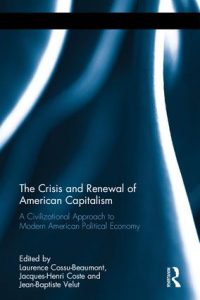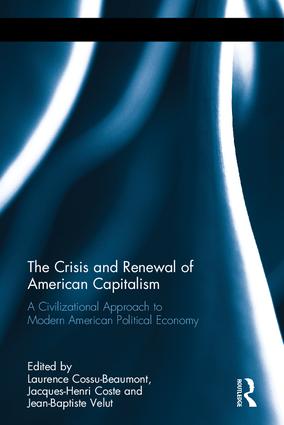 Preface to the book edited by Laurence plush-Beaumont, Jacques-Henri Coste and Jean-Baptiste Velut (2016): The Crisis and Renewal of American Capitalism: A Civilizational Approach to Modern American Political Economy, Routledge, London and New York, pp. xvii-xxii
Preface to the book edited by Laurence plush-Beaumont, Jacques-Henri Coste and Jean-Baptiste Velut (2016): The Crisis and Renewal of American Capitalism: A Civilizational Approach to Modern American Political Economy, Routledge, London and New York, pp. xvii-xxii
This book, which is the result of a collaborative work, and more than twenty years of research. This book was released in french in 2015 * in order to understand the different forms of Asian capitalism. The specificities of each of capitalism in Asia are explained with the theory of control. The Japan through the Korea China, the only way to understand each of these capital-intensive models is to analyse moments of crisis, breaking (the theory of the regulation).
To China special attention is brought to the difficulty to make it operational at the local level the competitive economic policy implemented by the central State.
To talk about in our studios, Robert Boyer, co-author of the book, former Director of research at the CNRS and leader of the theory of control in France. A book that caters to economists and researchers but neophytes can also enjoy through this Exchange "radio."
* University of Rennes press editions
France Culture books economy, show hosted by Dominique Rousset at 17:55.
December 14, 2015 (1/4) – plans of growth and periodic crises
December 15, 2016 (2/4) – that is not the theory of Regulation
December 16, 2016 (3/4) – diversity of capitalism
December 17, 2015-
Theory of regulation and crisis, the bookstore of Eco-Friday 4 December 2015, presented by Emmanuel Lechypre, on BFM Business.
Revista Trabajo – Nueva Época, Ano 11, no. 13, job, Ministerio de Trabajo y Seguridad Social, Buenos Aires (Argentina) November 2015, p. 91-110.
 Great reference manual, the discovery, Paris, October 2015
Great reference manual, the discovery, Paris, October 2015
Why was the growth of the post-war regime jammed? How to explain that financial innovations have first accelerated growth and developed into a major crisis? The euro was supposed to unify the old continent, widening a North-South divide?
The regulation theory answers these questions. At its inception in the 1970s, she borrowed from Marx the analysis of the dynamics of capitalism, the Annales school the need for a layout long historical perspective to the post-Keynesian macroeconomic tools. Since then, she continued to rework its concepts, its methods, and to extend its scope. Today, under the founding assumption of the role of institutions and their architecture, it is a political economy that explains stabilized growth plans and their crises, with special attention to the articulation of the economic and the political.
This book outlines the central concepts of the theory of control by placing over Orthodox theories, but also to the various heterodox alternatives. This manual of political economy, without equivalent, synthesizes several decades of work of an international network of researchers.
Presentation to the JECO Theatre of Célestins (REPLAY) 2015 (2015… by journeeseconomie on October 15, 2015
The world, the economy, for 11 days, October 11, 2015
Review of Political economy, Vol. 27, no. 4, October 2015, p. 481-517.
Abstract:
A number of contemporary paradoxes warrant explanation. First, in China, economic development has reduced poverty but dramatically increased inequalities. Second, the finance-led growth plan of North America has brought about a rupture with the Fordist Golden Age, causing a surge of inequality because of quite specific spill-over effects from the economy to policy. Third, the Eurozone crisis is often perceived as reflecting the limits of welfare states and the ideal of social equality, but some countries continues to exhibit year extended welfare system, moderate inequalities and a dynamic innovation and production system. To explain these paradoxes, this article applies a socio-economic approach based upon the concept of inequality systems. Conventional interpretations stress the universality of the mechanisms that widen individual inequalities within each nation – state goal reduce the hierarchy of national standards of living. This analysis, however, concludes that China, North America and Europe do not follow the same trajectory at all, since they have developed our systems of inequality that co-evolve and are largely complementary at the global level. This year suggests alternative to the hypothesis of year irreversible globalization of inequality.

